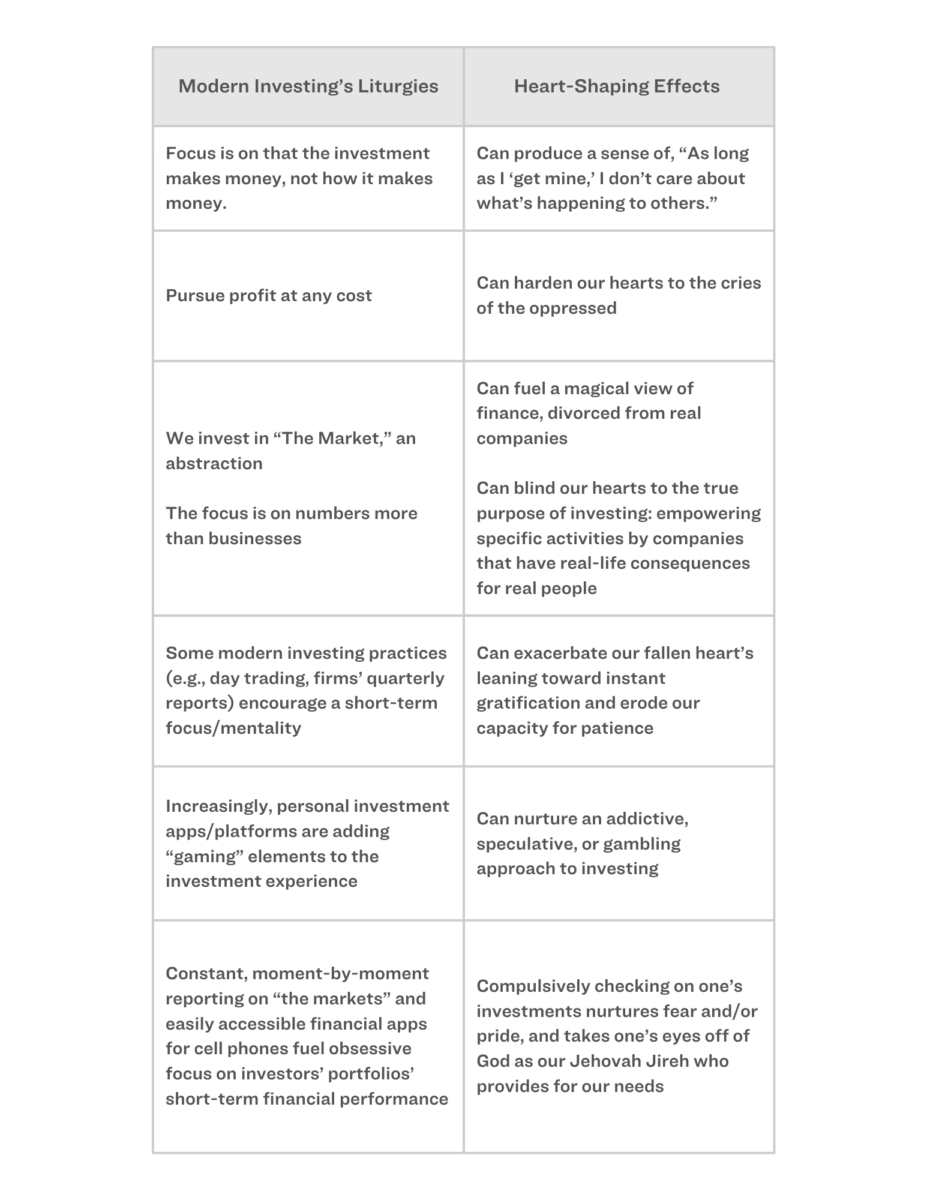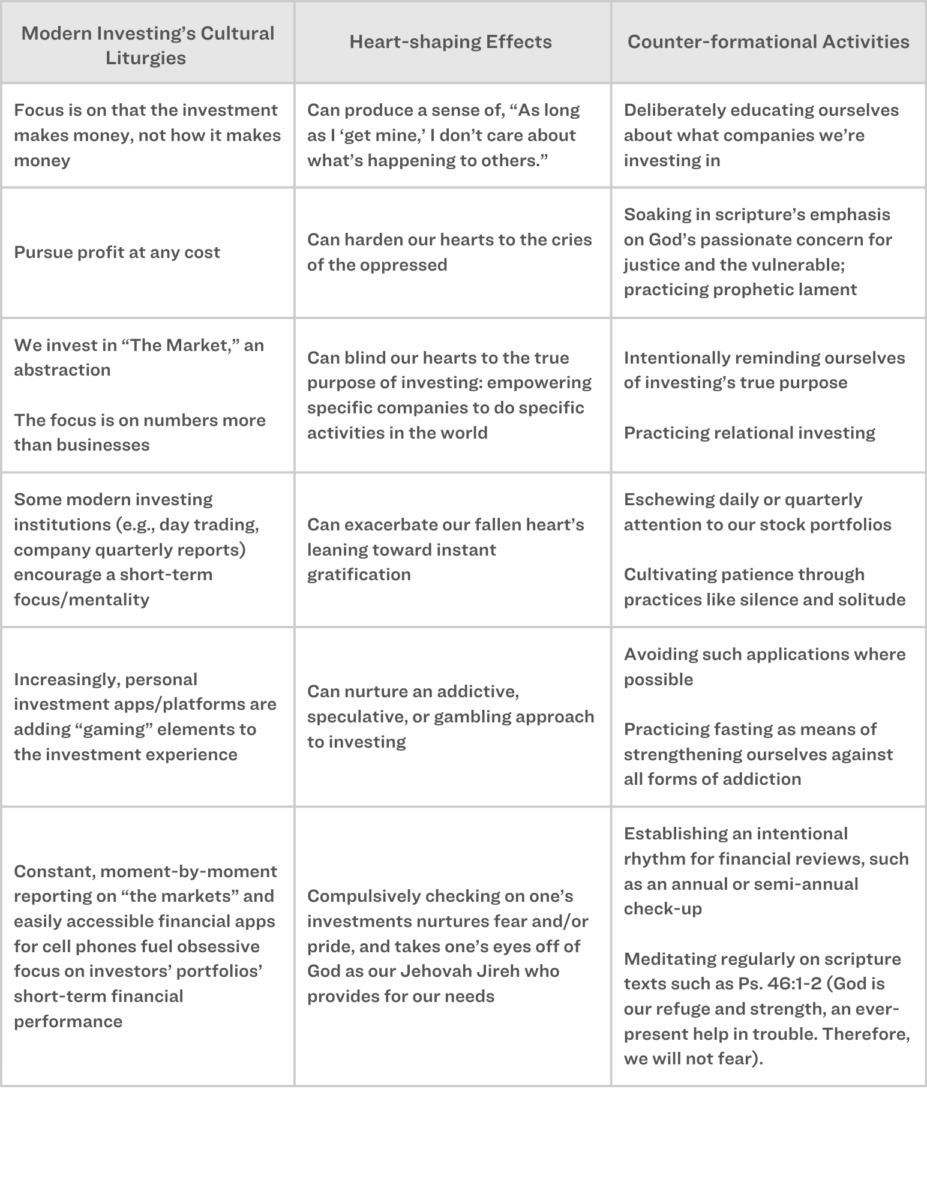Essay
How does the biblical metanarrative of creation, sin, and restoration shape how we invest?
Jesus taught that where our treasure is, there our heart will be also (Mt. 6:21). We usually interpret this to mean that our heart motivations direct our investments—and they do. If we are passionate for justice, for example, we will deploy resources toward efforts to pursue justice for those crying out for it.
But it’s also true that things we invest in can shape our hearts. Jesus seems to be emphasizing this dynamic in Matthew 6, since he puts the treasure part first and the heart part second. It’s the same dynamic Winston Churchill identified regarding architecture when he said (paraphrasing) that humans shape our buildings and then our buildings shape us.
In short, not only do our hearts “act on” on our investments, but our investments also “act on” our hearts.
When our investments are guided by the world’s story of what investing is, this can malform our hearts. This is because the contemporary finance sector is loaded with assumptions, images, rhythms, and practices—what philosopher James K.A. Smith calls “liturgies”—that have power to influence our desires and inclinations. As investors seeking to be faithful to Christ—who tells us to guard our hearts—we need to become alert to these dangers.
God’s Story and the World’s Story of Investing
The world’s story of investing is that it is often all about pursuing the highest, risk-adjusted rate of return we can find. God’s story is that investing is about supplying companies with the financial capital they need to produce “truly good” goods and services in a just and stewardly manner.
In God’s story, God owns everything and calls humans to steward the world he has made. This high calling includes being faithful trustees in the fields of business and finance. In Genesis 2:15, God calls humans to cultivate and keep his good creation. This work involves developing the latent potential of creation and bringing forth its full yield. However, humans are not free to make whatever we want out of God’s creation. The command to “keep” means that the things we produce must be in keeping with creation’s beauty and goodness.
This is why profits are not neutral in God’s eyes. Profits that emerge from products or services that are not in keeping with the beauty and goodness of God’s creation are not good profits. Investors benefiting from such profits are in effect receiving what the scriptures refer to as “ill-gotten” gains (Proverbs 1).
The world’s story of investing focuses on short-term gains, in part because of its essentially fearful and pessimistic approach to the world. It assumes a world of scarcity and ruthless competition. By contrast, Christ-followers understand that King Jesus means to renew all things in our broken world and calls us to participate. There are opportunities for win-win economic exchanges. With their eternal perspective, Christian investors can act from hope and love rather than from fear and greed.
Malforming Effects of Modern “Financial Liturgies”
Chart A below depicts some of the ways the world’s assumptions and practices around investing can covertly malform our hearts.

Chart A. Effects of Modern Financial Liturgies
Practicing investing in the context of the modern financial sector, without clear-eyed recognition of its assumptions and habits, can be corrosive. Our hearts can become narrowly focused on our own prosperity rather than on God’s invitation to join his mission of bringing flourishing. We can forget the embodied, relational nature of investing, thinking it is only about abstractions and numbers. We can be sucked into habits of obsessively checking our portfolios. This nurtures fear when our portfolios are down. Or it encourages pride: when they are up, we congratulate ourselves on our financial prowess. It also intensifies the temptation to trust in our wealth—rather than God—for our security.
Counter-formational Practices
The dynamics we’ve been examining indicate that faithful investors may need to engage in some deliberate practices that can counter the malforming influences of modern financial liturgies. Chart B below depicts some suggested actions of resistance.

Chart B. Counter-formational Activities
Exercises like meditating on scriptures focused on God’s sovereignty and provision, lamenting over the injustices many workers worldwide experience, and fasting strengthen our hearts. These activities direct us to trust God alone for our provisions. They increase our compassion toward neighbors far and near. They remind us that our investments involve us in global economic systems that have concrete influence on people made in God’s image.
Becoming educated about the ways in which our investment returns are gained helps us make wiser decisions as stewards of God’s money. Instead of investing time compulsively tracking our portfolio’s financial performance, what about spending it learning a little more about the companies in which we are invested?
Investing is Contested Space
Although we often fail to recognize it, the world of investing is contested space. God’s story and the world’s story posit contrasting ideas about what investing’s goals are and about the time horizon we should focus on. The world’s ideas are enacted in all-too-familiar practices and rhythms we think of as “normal,” but that act on our hearts in subtle, corrosive ways.
Paying attention to the effects of our investments on our wallets is far from sufficient. Faithfulness requires us to watch over their effects on our hearts with even greater diligence.
This communication is provided for informational purposes only and was made possible with the financial support of Eventide Asset Management, LLC (“Eventide”), an investment adviser. Eventide Center for Faith and Investing is an educational initiative of Eventide. Information contained herein has been obtained from third-party sources believed to be reliable.